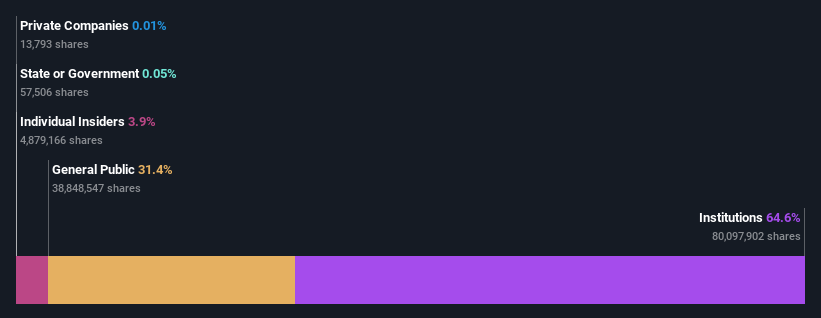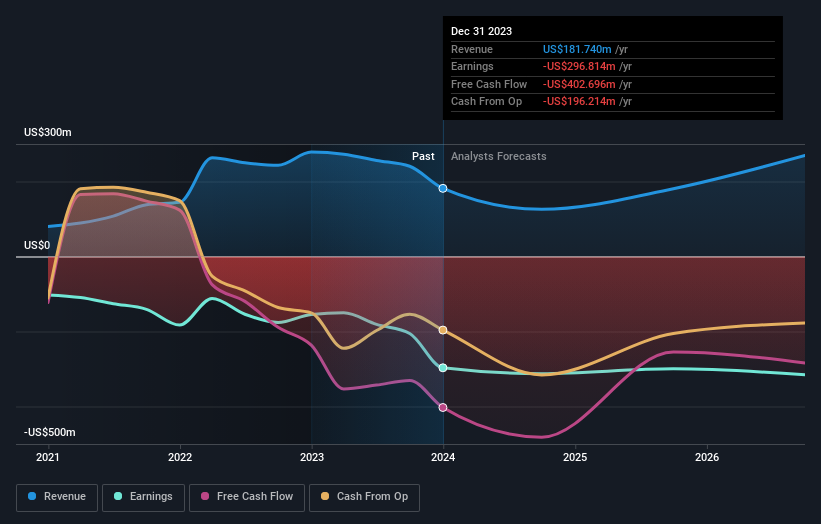Institutional investors may adopt severe steps after Arrowhead Pharmaceuticals, Inc.'s (NASDAQ:ARWR) latest 6.6% drop adds to a year losses
Key Insights
Significantly high institutional ownership implies Arrowhead Pharmaceuticals' stock price is sensitive to their trading actions
The top 22 shareholders own 50% of the company
If you want to know who really controls Arrowhead Pharmaceuticals, Inc. (NASDAQ:ARWR), then you'll have to look at the makeup of its share registry. The group holding the most number of shares in the company, around 65% to be precise, is institutions. Put another way, the group faces the maximum upside potential (or downside risk).
And institutional investors saw their holdings value drop by 6.6% last week. The recent loss, which adds to a one-year loss of 23% for stockholders, may not sit well with this group of investors. Also referred to as "smart money", institutions have a lot of sway over how a stock's price moves. As a result, if the downtrend continues, institutions may face pressures to sell Arrowhead Pharmaceuticals, which might have negative implications on individual investors.
Let's take a closer look to see what the different types of shareholders can tell us about Arrowhead Pharmaceuticals.
View our latest analysis for Arrowhead Pharmaceuticals
What Does The Institutional Ownership Tell Us About Arrowhead Pharmaceuticals?
Many institutions measure their performance against an index that approximates the local market. So they usually pay more attention to companies that are included in major indices.
Arrowhead Pharmaceuticals already has institutions on the share registry. Indeed, they own a respectable stake in the company. This suggests some credibility amongst professional investors. But we can't rely on that fact alone since institutions make bad investments sometimes, just like everyone does. If multiple institutions change their view on a stock at the same time, you could see the share price drop fast. It's therefore worth looking at Arrowhead Pharmaceuticals' earnings history below. Of course, the future is what really matters.
Investors should note that institutions actually own more than half the company, so they can collectively wield significant power. Hedge funds don't have many shares in Arrowhead Pharmaceuticals. Looking at our data, we can see that the largest shareholder is BlackRock, Inc. with 11% of shares outstanding. For context, the second largest shareholder holds about 10% of the shares outstanding, followed by an ownership of 5.5% by the third-largest shareholder. Additionally, the company's CEO Christopher Anzalone directly holds 3.0% of the total shares outstanding.
After doing some more digging, we found that the top 22 have the combined ownership of 50% in the company, suggesting that no single shareholder has significant control over the company.
Researching institutional ownership is a good way to gauge and filter a stock's expected performance. The same can be achieved by studying analyst sentiments. There are plenty of analysts covering the stock, so it might be worth seeing what they are forecasting, too.
Insider Ownership Of Arrowhead Pharmaceuticals
While the precise definition of an insider can be subjective, almost everyone considers board members to be insiders. Company management run the business, but the CEO will answer to the board, even if he or she is a member of it.
Most consider insider ownership a positive because it can indicate the board is well aligned with other shareholders. However, on some occasions too much power is concentrated within this group.
We can see that insiders own shares in Arrowhead Pharmaceuticals, Inc.. The insiders have a meaningful stake worth US$121m. Most would see this as a real positive. It is good to see this level of investment by insiders. You can check here to see if those insiders have been buying recently.
General Public Ownership
The general public-- including retail investors -- own 31% stake in the company, and hence can't easily be ignored. While this group can't necessarily call the shots, it can certainly have a real influence on how the company is run.
Next Steps:
It's always worth thinking about the different groups who own shares in a company. But to understand Arrowhead Pharmaceuticals better, we need to consider many other factors. Consider risks, for instance. Every company has them, and we've spotted 3 warning signs for Arrowhead Pharmaceuticals you should know about.
But ultimately it is the future, not the past, that will determine how well the owners of this business will do. Therefore we think it advisable to take a look at this free report showing whether analysts are predicting a brighter future.
NB: Figures in this article are calculated using data from the last twelve months, which refer to the 12-month period ending on the last date of the month the financial statement is dated. This may not be consistent with full year annual report figures.
Have feedback on this article? Concerned about the content? Get in touch with us directly. Alternatively, email editorial-team (at) simplywallst.com.
This article by Simply Wall St is general in nature. We provide commentary based on historical data and analyst forecasts only using an unbiased methodology and our articles are not intended to be financial advice. It does not constitute a recommendation to buy or sell any stock, and does not take account of your objectives, or your financial situation. We aim to bring you long-term focused analysis driven by fundamental data. Note that our analysis may not factor in the latest price-sensitive company announcements or qualitative material. Simply Wall St has no position in any stocks mentioned.

 Yahoo Finance
Yahoo Finance 

